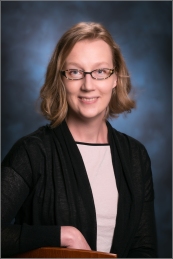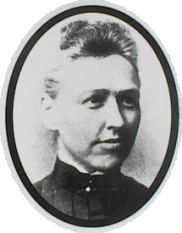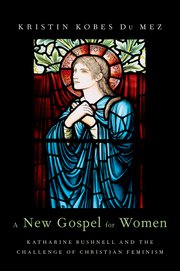 Katharine (Kate) Bushnell (1855-1946) was by any measure a remarkable figure in the history of Christian feminism. A global anti-trafficking activist and author of God’s Word to Women, a fascinating feminist theology that recasts the entire biblical narrative as a story of liberation for women, Bushnell was once widely known throughout the late-nineteenth-century Protestant world.
Katharine (Kate) Bushnell (1855-1946) was by any measure a remarkable figure in the history of Christian feminism. A global anti-trafficking activist and author of God’s Word to Women, a fascinating feminist theology that recasts the entire biblical narrative as a story of liberation for women, Bushnell was once widely known throughout the late-nineteenth-century Protestant world.
A Midwestern Methodist, Bushnell came of age in Evanston, IL. After a brief stint as a medical missionary to China, she helped launch the American “social purity” movement by leading a dramatic exposé of the trafficking of women in Wisconsin lumber camps. Drawing attention to the injustices women faced under the Victorian sexual double standard, Bushnell helped break the “conspiracy of silence” that inhibited discussion of sexuality among “respectable” women and men. She then took her activism overseas, where she exposed the abusive practices of the British army in colonial India, particularly when it came to the confinement and abuse of local women in military brothels.

While campaigning against prostitution and the trafficking of women, Bushnell was shocked to discover that the men guilty of abusing women were more often than not Christian men. Ultimately, she concluded that patriarchal theology must be to blame.
Rather than abandoning Christianity in its entirety, she drew on her background in classical languages and began retranslating the Scriptures in an effort to undo a centuries-long tradition of male bias that had distorted the biblical text.
In her hands, the Scriptures told a very different story. Woman had been created equal (if not superior) to man. It was not Eve’s sin that had led to the Fall of humanity, but Adam’s (Eve rightly blamed the Serpent, but Adam blamed God). Eve had, however, sinned in turning away from God to follow Adam out of Eden. Thus, women sinned when they submitted to men, rather than to God, and men sinned in usurping God’s authority, and in dominating women.
Bushnell identified a number of gendered patterns of mistranslation, particularly when it came to concepts like courage, chastity, and modesty. She discovered new meanings for obscure Old Testament passages, as well as for familiar New Testament passages on wifely submission and female authority. Indeed, she presented the Apostle Paul as quite enlightened on “the woman question.”
Bushnell believed that redemption would bring about women’s social and spiritual emancipation, a redemption foretold in Jeremiah 31:22: “It seems God’s design that the ‘new woman’ in Christ Jesus shall no more ‘turn away,’ as did Eve, to her husband,” she explained, “but remaining loyal to God alone, and true to her destiny as the mother of that Seed…shall lead man about,–out of the wilderness of the inefficiency of egotism into the glorious liberty of the children of God.”
Remarkably, Bushnell’s theology garnered enthusiastic reviews from a number of conservative biblical scholars. The Moody Monthly, for example, offered a hearty endorsement of the book in 1921. They, like other conservatives, approved of her loyalty to Scriptural authority at a time when many modernists seemed to be abandoning the very foundations of the faith.
 And yet, Bushnell’s teachings failed to reach large audiences in the 1920s and 1930s. Changes within American Protestantism and within the women’s movement left Bushnell increasingly marginalized, and her life and work were quickly forgotten. Even so, a small but devoted group of followers—initially Pentecostals and Methodists, in particular—worked to keep her memory alive. In recent decades her writings have been influential among a number of “biblical feminists”—among those who want to uphold the authority of the Scriptures, yet see in the gospel message a story of liberation and redemption, for women as well as for men. And in an interesting turn of events, Bushnell’s writings are once again reaching a global audience, as women in the Majority World are finding in her theology a biblical basis for the rejection of patriarchy and the empowerment of women.
And yet, Bushnell’s teachings failed to reach large audiences in the 1920s and 1930s. Changes within American Protestantism and within the women’s movement left Bushnell increasingly marginalized, and her life and work were quickly forgotten. Even so, a small but devoted group of followers—initially Pentecostals and Methodists, in particular—worked to keep her memory alive. In recent decades her writings have been influential among a number of “biblical feminists”—among those who want to uphold the authority of the Scriptures, yet see in the gospel message a story of liberation and redemption, for women as well as for men. And in an interesting turn of events, Bushnell’s writings are once again reaching a global audience, as women in the Majority World are finding in her theology a biblical basis for the rejection of patriarchy and the empowerment of women.
Long forgotten, Bushnell’s story is a fascinating one—one that reveals the contours of a larger history of Christianity and feminism, in America and around the globe.
Kristin Kobes Du Mez is the author of A New Gospel for Women: Katharine Bushnell and the Challenge of Christian Feminism, recently released from Oxford University Press.


Thank you for bringing Katharine Bushnell’s work to us through your post and book. I hadn’t known about her before. Her work and story are reminiscent of Matilda Joslyn Gage, who in the 1890s also exposed similar kinds of abuses against women, drew the connection to patriarchal theology in her book Woman, Church, and State, and is not, I believe, widely known. It’s wonderful to learn about the work of these courageous and insightful foremothers.
LikeLike
You are right I never heard of this amazing woman who was also a doctor. Here is some additional information for FAR readers: http://www.bu.edu/missiology/missionary-biography/a-c/bushnell-katharine-c-1855%E2%80%931946/
Was she related to Horace Bushnell?
LikeLike
Only distantly related, and she doesn’t seem to have known him personally. Although she does play off the title of one of his books in her own writing. But I’m so glad you’re now making her acquaintance–she really is a remarkable woman.
LikeLike
Did Bushnell ever work with Jane Addams?
LikeLike
No, she doesn’t seem to have done so, at least not directly. She moved in the WCTU orbit at that time, and by the early 1890s was turning her attention globally to prostitution in the British empire.
LikeLike
I once translated the Book of Ruth directly from the Hebrew, using a biblical Hebrew-English dictionary, and I could hardly believe how often the nuances of the text were completely lost, and sometimes it seemed, purposely mistranslated. And so I can truly relate to the work Katherine Bushnell did and why she thought it so important. Just for fun, though, I wonder what the reaction in her time would have been to a book titled, “When God Was a Woman.”
LikeLike
Fascinating! It’s wonderful to hear about these foremothers and their work. How would the world be different if the male leaders of the churches had paid attention to women like Gage and Bushnell? Thanks for writing this blog.
LikeLike
Thank you. Although the overlap is not that close as I read this I could not help but think of my grandmother, who was born in IL a few decades after the Civil War and eventually became a Christian Scientist after WW I. I am curious if you have (in your book on B. or elsewhere) written/discussed the ‘aftershock’ effects of war on the American women’s movement in particular.
LikeLike
In the book I write quite a bit on WWI itself. It was a watershed moment for Bushnell in her relation to the women’s movement. She was still working out of “social purity” ideals, which meant opposing the government regulation of prostitution and venereal disease. Most mainstream women’s rights, activists, however, were either taken up with patriotism and/or conceded that the regulation of prostitution (prostitutes) was necessary for the protection of American soldiers, and so they supported regulation–which Bushnell felt trampled the rights of women (especially prostitutes). But by advocating restraint over regulation, Bushnell was out of step with the mainstream women’s movement–and many Protestant churches, by that point. From that time on she’s pretty marginalized. And of course the women’s movement itself lacks the broader unity it had achieved in earlier decades, particularly among Christian women.
LikeLike
Thanks–I hope to write a post about my grandmother in the future and since I know only bits and pieces about her life (eg she was working in NJ/NY during WWI) context such as you have for Bushnell may well be relevant.
LikeLike
I did my history thesis on the Woman’s Mission Movement yet I don’t remember reading about her, so thank you so much for introducing me to Katharine Bushnell!
LikeLike
Thanks for introducing me to Katherine Bushnell, Kristin. Reading your blog post, it seems her work regarding prostitutionwas ahead of its time. I especially loved her reframing of the Adam and Eve story: “Woman had been created equal (if not superior) to man. It was not Eve’s sin that had led to the Fall of humanity, but Adam’s (Eve rightly blamed the Serpent, but Adam blamed God). Eve had, however, sinned in turning away from God to follow Adam out of Eden. Thus, women sinned when they submitted to men, rather than to God, and men sinned in usurping God’s authority, and in dominating women.” Wow!! Sock it to patriarchy!
LikeLike
Thank you. I too have not heard of her. Other earlier writers have also written about Eve and Adam e.g. Abbess Hildergard of Bingen (1098-1179); Christine de Pizan (1365-1430) – she rehabilitated Eve in her ‘The Book of the City of Ladies); Sarah Joseph Hale (1788-1879) in her ‘Woman’s Record’ published 1853 to mention a few …
LikeLike
Being hungry for God and his Word need to be a daily part of the disciple’s life.
LikeLike
I love Katharine Bushnell. I came across her book by accident and she changed my life. For all those interested, please go to God’s Word to Women website and check out all her writings. She is a remarkable woman of God.
LikeLike